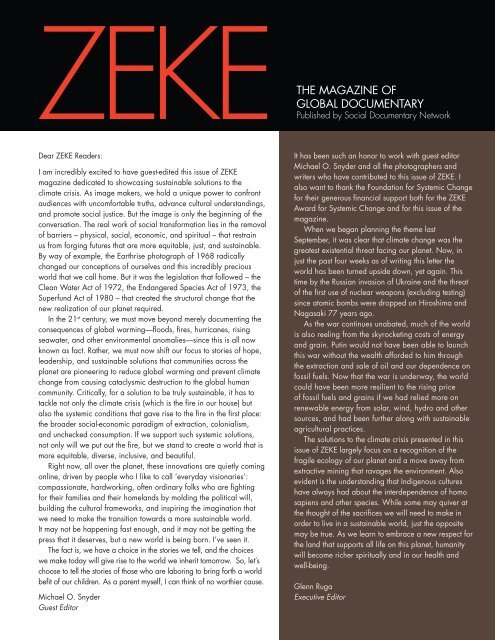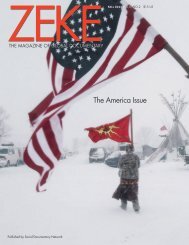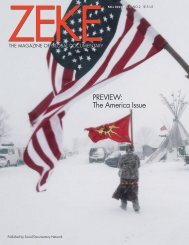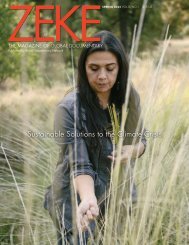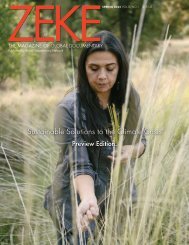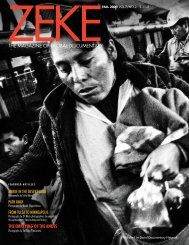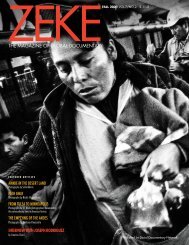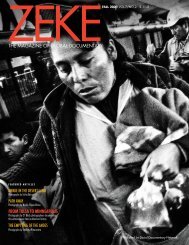ZEKE Magazine: Spring 2022
Sustainable Solutions to the Climate Crisis Indigenous Fire by Kiliii Yuyan The Indigenous Peoples' Burn Network is training others in an ancient technique of ecological restoration, which is to safely light low-intensity fires in wet seasons that remove the small fuels on the forest floor. Nemo's Garden by Giacomo d'Orlando Nemo’s Garden—the world’s first underwater greenhouses of terrestrial plants—represents an alternative farming system dedicated to those areas where environmental conditions make the growth of plants almost impossible. Permagarden Refugees by Sarah Fretwell The Palabek refugee settlement in Northern Uganda, with the staff of African Women Rising’s (AWR) Permagarden Program, works with refugees to utilize the existing resources—seeds, rainfall, limited land, and “waste”—and together build an agriculture system designed to help the environment regenerate and get stronger as it matures. Sustainable Solutions to the Climate Crisis by Antonia Juhasz Interview with Kiliii Yuyan by Caterina Clerici Dispatches from Ukraine by Maranie Staab Book Reviews Edited by Michelle Bogre
Sustainable Solutions to the Climate Crisis
Indigenous Fire by Kiliii Yuyan
The Indigenous Peoples' Burn Network is training others in an ancient technique of ecological restoration, which is to safely light low-intensity fires in wet seasons that remove the small fuels on the forest floor.
Nemo's Garden by Giacomo d'Orlando
Nemo’s Garden—the world’s first underwater greenhouses of terrestrial plants—represents an alternative farming system dedicated to those areas where environmental conditions make the growth of plants almost impossible.
Permagarden Refugees
by Sarah Fretwell
The Palabek refugee settlement in Northern Uganda, with the staff of African Women Rising’s (AWR) Permagarden Program, works with refugees to utilize the existing resources—seeds, rainfall, limited land, and “waste”—and together build an agriculture system designed to help the environment regenerate and get stronger as it matures.
Sustainable Solutions to the Climate Crisis
by Antonia Juhasz
Interview with Kiliii Yuyan by Caterina Clerici
Dispatches from Ukraine by Maranie Staab
Book Reviews Edited by Michelle Bogre
Create successful ePaper yourself
Turn your PDF publications into a flip-book with our unique Google optimized e-Paper software.
<strong>ZEKE</strong><br />
THE<br />
MAGAZINE OF<br />
GLOBAL DOCUMENTARY<br />
Published by Social Documentary Network<br />
Dear <strong>ZEKE</strong> Readers:<br />
I am incredibly excited to have guest-edited this issue of <strong>ZEKE</strong><br />
magazine dedicated to showcasing sustainable solutions to the<br />
climate crisis. As image makers, we hold a unique power to confront<br />
audiences with uncomfortable truths, advance cultural understandings,<br />
and promote social justice. But the image is only the beginning of the<br />
conversation. The real work of social transformation lies in the removal<br />
of barriers – physical, social, economic, and spiritual – that restrain<br />
us from forging futures that are more equitable, just, and sustainable.<br />
By way of example, the Earthrise photograph of 1968 radically<br />
changed our conceptions of ourselves and this incredibly precious<br />
world that we call home. But it was the legislation that followed – the<br />
Clean Water Act of 1972, the Endangered Species Act of 1973, the<br />
Superfund Act of 1980 – that created the structural change that the<br />
new realization of our planet required.<br />
In the 21 st century, we must move beyond merely documenting the<br />
consequences of global warming—floods, fires, hurricanes, rising<br />
seawater, and other environmental anomalies—since this is all now<br />
known as fact. Rather, we must now shift our focus to stories of hope,<br />
leadership, and sustainable solutions that communities across the<br />
planet are pioneering to reduce global warming and prevent climate<br />
change from causing cataclysmic destruction to the global human<br />
community. Critically, for a solution to be truly sustainable, it has to<br />
tackle not only the climate crisis (which is the fire in our house) but<br />
also the systemic conditions that gave rise to the fire in the first place:<br />
the broader social-economic paradigm of extraction, colonialism,<br />
and unchecked consumption. If we support such systemic solutions,<br />
not only will we put out the fire, but we stand to create a world that is<br />
more equitable, diverse, inclusive, and beautiful.<br />
Right now, all over the planet, these innovations are quietly coming<br />
online, driven by people who I like to call ‘everyday visionaries’:<br />
compassionate, hardworking, often ordinary folks who are fighting<br />
for their families and their homelands by molding the political will,<br />
building the cultural frameworks, and inspiring the imagination that<br />
we need to make the transition towards a more sustainable world.<br />
It may not be happening fast enough, and it may not be getting the<br />
press that it deserves, but a new world is being born. I’ve seen it.<br />
The fact is, we have a choice in the stories we tell, and the choices<br />
we make today will give rise to the world we inherit tomorrow. So, let’s<br />
choose to tell the stories of those who are laboring to bring forth a world<br />
befit of our children. As a parent myself, I can think of no worthier cause.<br />
Michael O. Snyder<br />
Guest Editor<br />
It has been such an honor to work with guest editor<br />
Michael O. Snyder and all the photographers and<br />
writers who have contributed to this issue of <strong>ZEKE</strong>. I<br />
also want to thank the Foundation for Systemic Change<br />
for their generous financial support both for the <strong>ZEKE</strong><br />
Award for Systemic Change and for this issue of the<br />
magazine.<br />
When we began planning the theme last<br />
September, it was clear that climate change was the<br />
greatest existential threat facing our planet. Now, in<br />
just the past four weeks as of writing this letter the<br />
world has been turned upside down, yet again. This<br />
time by the Russian invasion of Ukraine and the threat<br />
of the first use of nuclear weapons (excluding testing)<br />
since atomic bombs were dropped on Hiroshima and<br />
Nagasaki 77 years ago.<br />
As the war continues unabated, much of the world<br />
is also reeling from the skyrocketing costs of energy<br />
and grain. Putin would not have been able to launch<br />
this war without the wealth afforded to him through<br />
the extraction and sale of oil and our dependence on<br />
fossil fuels. Now that the war is underway, the world<br />
could have been more resilient to the rising price<br />
of fossil fuels and grains if we had relied more on<br />
renewable energy from solar, wind, hydro and other<br />
sources, and had been further along with sustainable<br />
agricultural practices.<br />
The solutions to the climate crisis presented in this<br />
issue of <strong>ZEKE</strong> largely focus on a recognition of the<br />
fragile ecology of our planet and a move away from<br />
extractive mining that ravages the environment. Also<br />
evident is the understanding that Indigenous cultures<br />
have always had about the interdependence of homo<br />
sapiens and other species. While some may quiver at<br />
the thought of the sacrifices we will need to make in<br />
order to live in a sustainable world, just the opposite<br />
may be true. As we learn to embrace a new respect for<br />
the land that supports all life on this planet, humanity<br />
will become richer spiritually and in our health and<br />
well-being.<br />
Glenn Ruga<br />
Executive Editor<br />
Matthew Lomanno<br />
<strong>ZEKE</strong> SPRING <strong>2022</strong>/ 1


